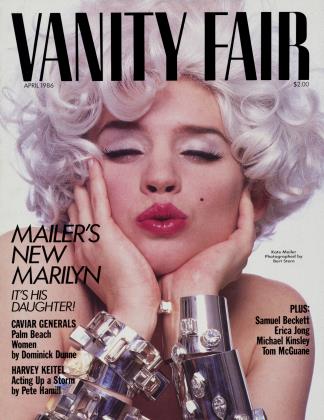Sign In to Your Account
Subscribers have complete access to the archive.
Sign In Not a Subscriber?Join NowHot Type
Even an open-minded reader would think twice before reading a 320-page first novel written entirely in verse. Strangely enough, such a reader would be making a great mistake. For in The Golden Gate(Random House), Vikram Seth not only has resurrected (even reinvented) an old form but has written one of the best first novels of the year. The Golden Gate is at once a bittersweet love story, a wickedly funny American novel of manners, and an unsentimental meditation on mortality and the nuclear abyss. Always witty—and still, in its reticent way, profound—the book paints a truthful picture of our dreadful, comic times. Seth’s characters can talk of cats and nuclear missiles, loneliness and law firms, art criticism and compassion. They are real people, both charming and engaging.
Occasionally, Seth takes a break from describing their dramas to meditate on what he is up to in the book. At a party, he meets an editor who asks, “ ‘What’s your next work?’ ‘A novel... ’ ‘Great! / We hope that you, dear Mr. Seth—’/*... In
verse,’ I added. He turned yellow. / ‘How marvelously quaint,’ he said, / And subsequently cut me dead.”
A foolish editor, for Seth shows that any form, when handled this well, can come alive. The Golden Gate is a miraculous creation.
David Rieff
The fabled gastronome A. J. Liebling was not put off by niggling worries about his liver; he doubted its very existence. Unhindered by guilt, he fed voraciously, till you could barely fit beside him on the sidewalk. But, as was known by readers of The New Yorker, his prose was always slim and trim.
In a luminous introduction to this final collection of essays, Between Meals: An Appetite for Paris (North Point Press), James Salter compares the reminiscences to A Moveable Feast. Only more fun. Checking out la cuisine franqaise in its crepuscular phase—waning but still glorious when he got there in 1926—Liebling celebrated Paris as only a bon vivant could: digressing to discuss boxing, theater, and the “hepatic fallacy” designed, as he saw it, to scare off amateur feeders. But it was mealtime he always came back to, dispatching a lunch of noble overabundance before whacking dinner.
Whether marveling at the marriage of oyster and lemon or slaying hostesses with hypocrisies (he delighted himself by finding new capacities for the art), Liebling never failed to bring a knowledge and perceptivity to his subject. Eclat, in a word; at typewriter or at table, the man could pack it away.
Daniel Asa Rose
It comes as no surprise that Lord Antony Lambton’s Elizabeth and Alexandra (E. P. Dutton) engages the reader through a nineteenth-century, female sensibility. His short stories were striking for their perceptive portrayals of women and an elegant, Jamesian discursiveness. Elizabeth and Alix of Hesse were granddaughters of Queen Victoria, who was still sifting the dynastic liaisons of Europe through brittle fingers when she oversaw their marriages to their Romanov cousins: Ella to Grand Duke Serge, whose vicious eccentricities and sexual predilections were remarkable even for a Romanov, and Alix to Serge’s passive nephew, Nicky, who would later become the last czar. Lambton’s narrative moves at a pace of almost erotic languor. Ella’s childhood in Hesse—a Victorian model of middle-class domestic virtue among the royals—is contrasted with the byzantine opulence and decadence of the final days of the imperial Russian court.
One of Lambton’s most original contributions is his account of Ella’s last days in Moscow in the form of her own diary. In a brilliant epilogue, set in 1946, Lambton vividly imagines what might have befallen the ill-fated sisters—a brilliant, macabre scene worthy of Beckett at his most absurd.
Cristina Monet
 View Full Issue
View Full Issue


















Subscribers have complete access to the archive.
Sign In Not a Subscriber?Join Now